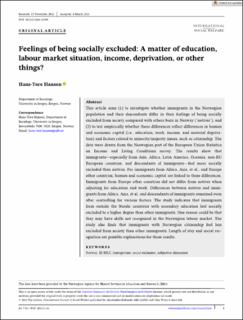Feelings of being socially excluded: A matter of education, labour market situation, income, deprivation, or other things?
Journal article, Peer reviewed
Published version

Åpne
Permanent lenke
https://hdl.handle.net/11250/3114320Utgivelsesdato
2023Metadata
Vis full innførselSamlinger
- Department of Sociology [429]
- Registrations from Cristin [9791]
Sammendrag
This article aims (1) to investigate whether immigrants in the Norwegian population and their descendants differ in their feelings of being socially excluded from society compared with others born in Norway (‘natives’), and (2) to test empirically whether these differences reflect differences in human and economic capital (i.e., education, work, income, and material deprivation) and factors related to minority/majority issues, such as citizenship. The data were drawn from the Norwegian part of the European Union Statistics on Income and Living Conditions survey. The results show that immigrants—especially from Asia, Africa, Latin America, Oceania, non-EU European countries, and descendants of immigrants—feel more socially excluded than natives. For immigrants from Africa, Asia, et al., and Europe other countries, human and economic capital are linked to these differences. Immigrants from Europe other countries did not differ from natives when adjusting for education and work. Differences between natives and immigrants from Africa, Asia, et al. and descendants of immigrants remained even after controlling for various factors. The study indicates that immigrants from outside the Nordic countries with secondary education feel socially excluded to a higher degree than other immigrants. One reason could be that they may have skills not recognised in the Norwegian labour market. The study also finds that immigrants with Norwegian citizenship feel less excluded from society than other immigrants. Length of stay and social recognition are possible explanations for these results.
